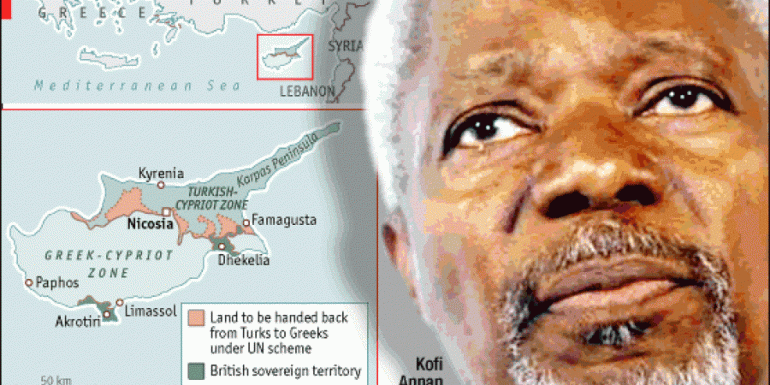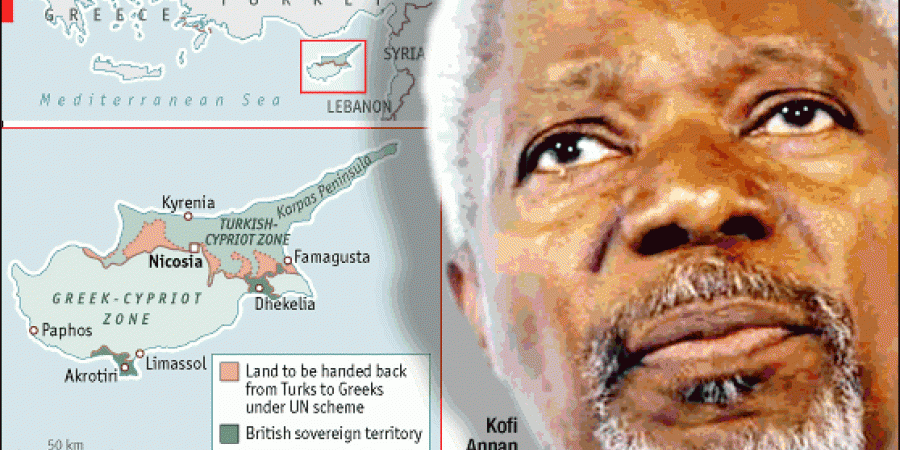By Michalis Antoniou *:
The then UN Secretary-General, Kofi Annan, after whom the plan was named, managed to bring the two communities within walking distance of the coveted solution.
On 11/11/2002, the UN Secretary-General submitted a comprehensive plan for the settlement of the Cyprus problem, which was rejected by the Turkish Cypriot side following objections from Ankara, which forced the Secretary-General to review and submit on 10/12/2002 a new comprehensive proposal which again provoked reactions from Turkey.
On 26/02/2003, Kofi Annan submitted a new draft proposal. The two leaders were summoned to New York for talks on the new plan. On 24/04/2004 he presented himself before the Cypriot people with separate referendums. The referendum was rejected by 75,8% of Greek Cypriots and approved by 64,9% of Turkish Cypriots.
In February 2003, the late Tassos Papadopoulos defeated then-president Glafkos Clerides in the presidential election. Taking the reins of the Republic of Cyprus, he considered that the Annan plan hid deadly dangers for the Greek Cypriots, arguing that this posed a permanent threat to the security, functionality and therefore the viability of the Cypriot state. Besides, he stated it in his speech to the Cypriot people, on the eve of the referendum, calling on them to reject the plan.
The result of the referendum brought friction between the Greek Cypriot political parties. The events that followed the referendum are well known, with President Papadopoulos calling even political leaders infidels, meaning those who advocated for the plan.
One who watches the Cyprus problem from his "infantile" form, can not feel sure that the decision of the Greek Cypriots was right, given that every new plan presented to us "recalls" the previous one. If one takes into account that the Cyprus problem, as long as it lasts and is tired, one will find that with it the hopes of the Cypriot people for the solution of the problem grow old.
People leave and come. Who has the opposite opinion that the young Greek Cypriots have less demands than those who lived in the occupied territories and experienced the Cyprus problem in its genesis? However, the opposite is happening in the Turkish Cypriot community. That is, young people, even if they are the offspring of settlers, have more demands, meaning that they have not known another homeland. The more the problem is perpetuated and prolonged, the more difficult it becomes. I firmly believe that apart from the other aspects of the problem (governance, structure, territorial, etc.) here lies the complexity.
In other words, we have on the one hand a descendant of a settler who knew no other homeland but only the occupied territories of the Republic of Cyprus and on the other a Greek Cypriot who never met or lived in the occupied territories. In a few years this will be the population character of Cyprus.
Summarizing the facts and looking at Turkey's behavior, who thinks they are better off? Turkey must pursue a new policy that is in line with the new order of things as it is formed in our wider region if it wants to play a primary economic role but also to benefit from its integration into Europe. On the other hand, the Greek Cypriot leadership must listen to the dangers of perpetuating the problem and dare. Eidomen !!
* Michalis Antoniou, Student of Sociology at Panteion University

